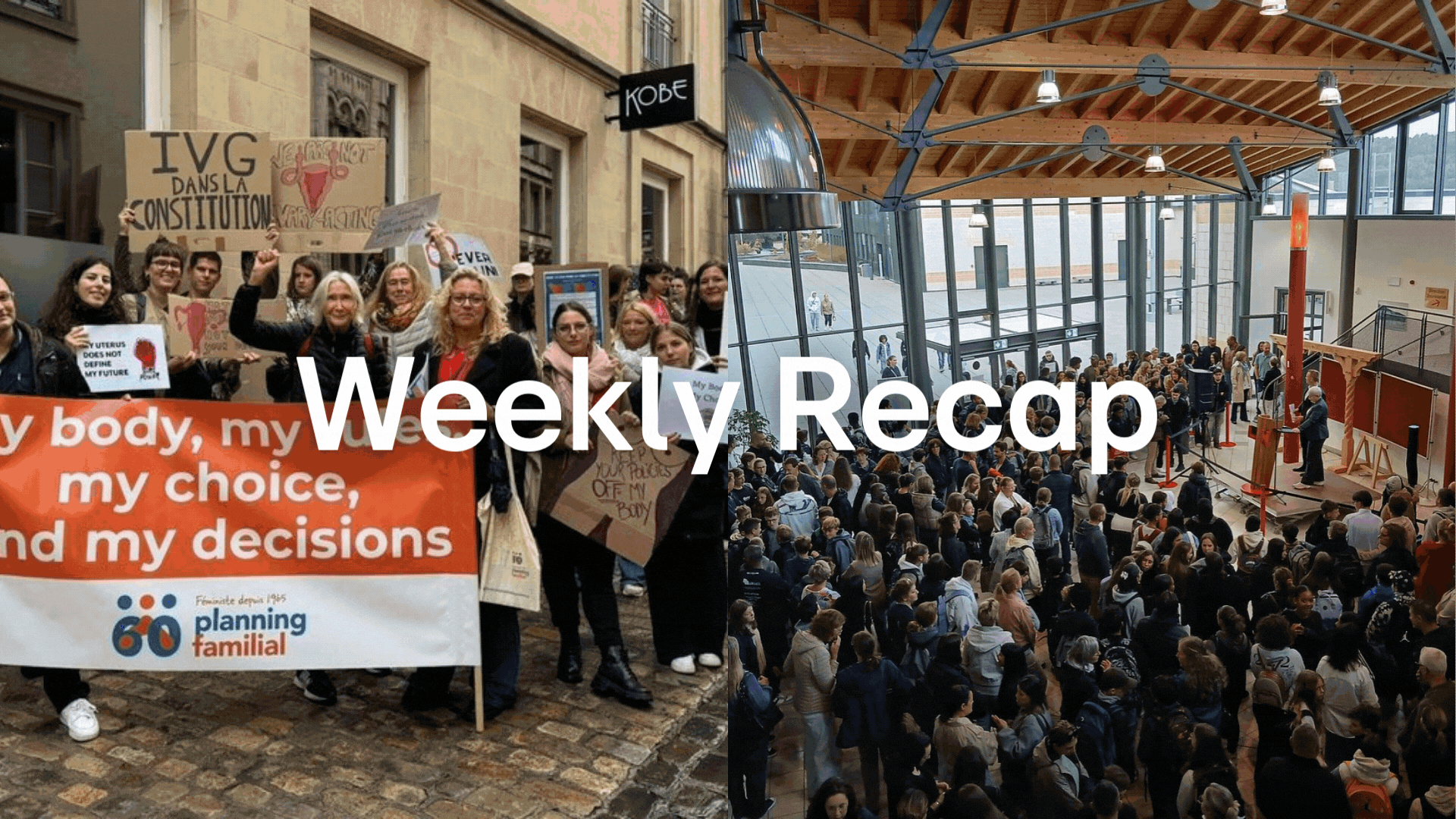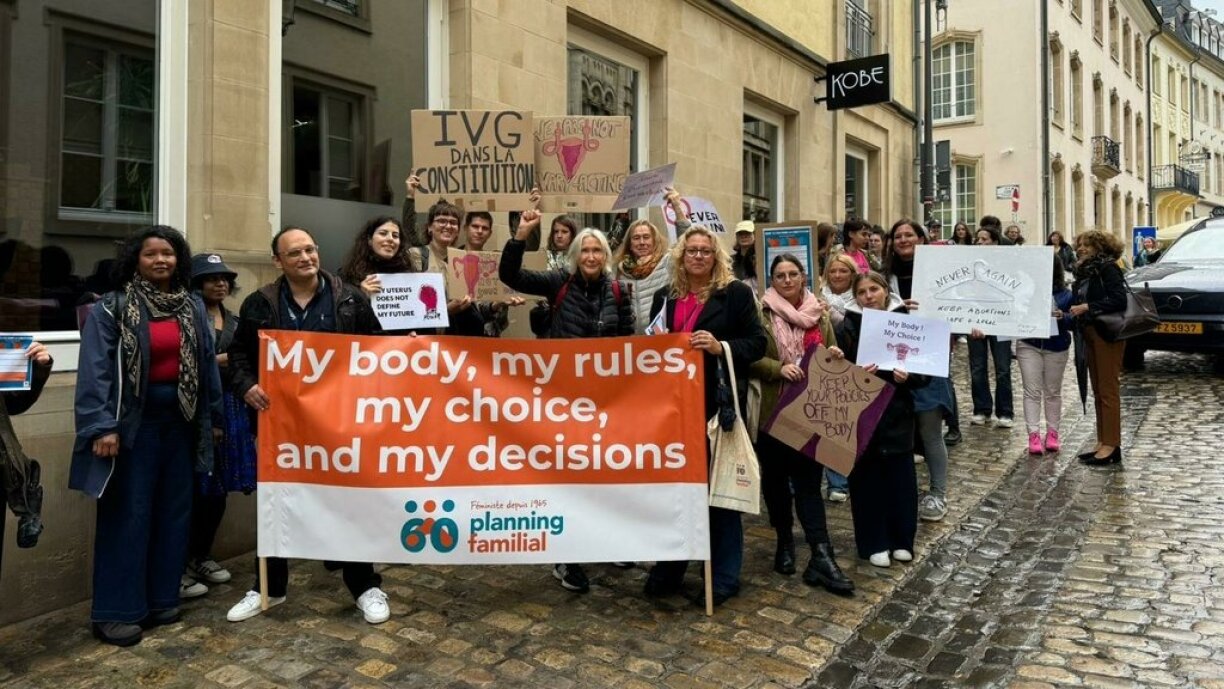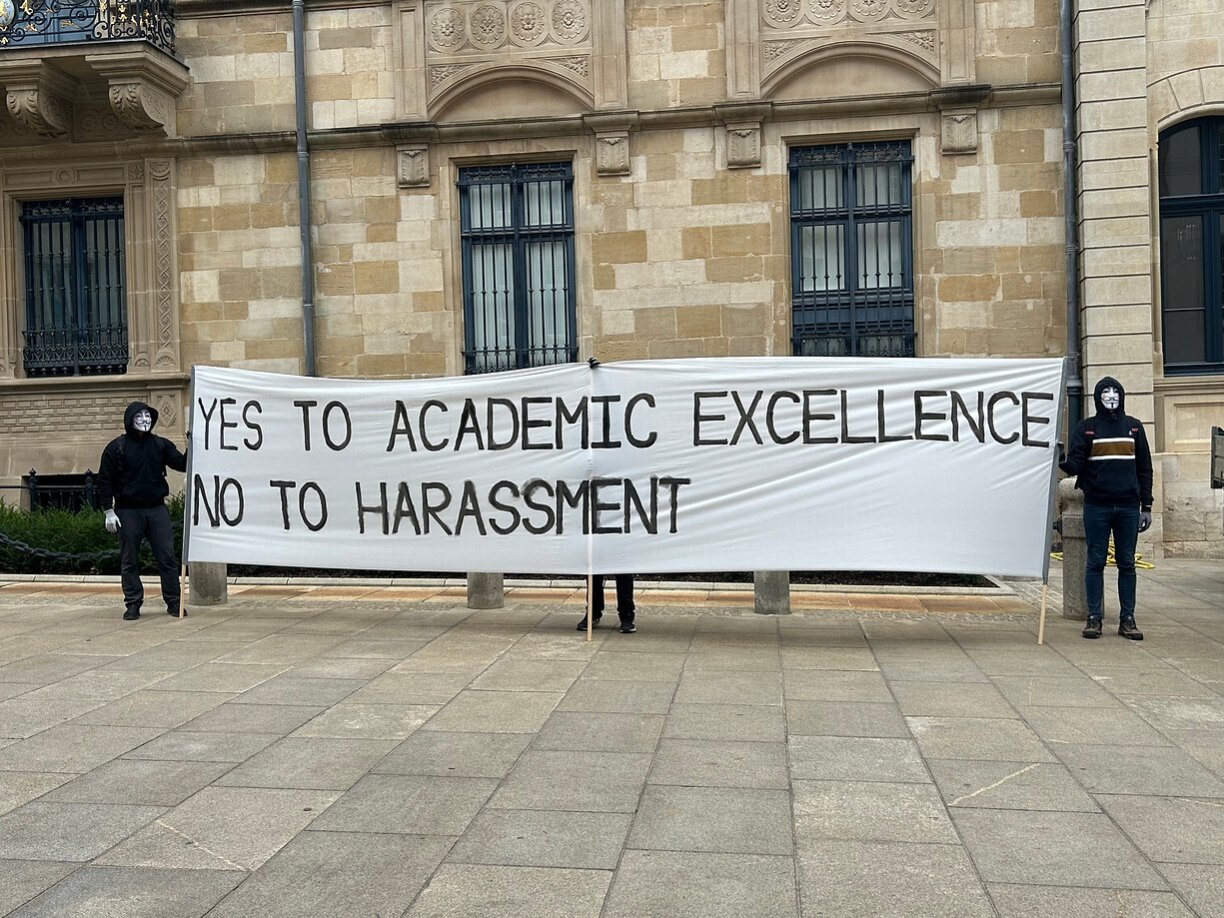
Here are five things you should know at the end of this week:

Luxembourg’s Parliament has opened the debate on a proposal to enshrine abortion rights in the Constitution, an initiative introduced by Marc Baum (the Left) that was met with mixed reactions.
A fundamental right? – The debate was triggered by a bill from the Left (déi Lénk), which seeks to enshrine the right to abortion in the Constitution to ensure it cannot easily be reversed. Earlier this week, the Parliament placed the proposal on its agenda, sparking renewed political and social debate.
The Democratic Party (DP), the Greens, and the Luxembourg Socialist Workers’ Party (LSAP) all expressed support, though the DP highlighted the need for careful phrasing. LSAP’s Taina Bofferding warned that global setbacks on human rights showed the urgency of constitutional safeguards. While the ADR’s Fred Keup rejected the initiative outright, insisting abortion rights did not belong in the Constitution, the Christian Social People’s Party (CSV), through its president Luc Frieden, said on Wednesday that abortion should be regarded as a freedom rather than an absolute right – an important distinction regarding the potentially restricting role by the legislator.
Frieden would later speak in the role of Prime Minister, highlighting the need for broad social consensus.
Not if the church can help it – Cardinal Jean-Claude Hollerich warned that enshrining abortion rights in Luxembourg’s constitution would mark a “sad day” and risk giving the country “features of a totalitarian system.” He argued that constitutionalising abortion, which is already legal, would impose a single viewpoint on society, restrict doctors’ freedom to refuse the procedure, and alienate Catholic communities, potentially driving some toward right-wing extremism.
While clarifying that he does not support punishing women who undergo abortions, Hollerich reaffirmed his opposition to the practice itself. He appealed to politicians to consider the long-term consequences of such a constitutional change, insisting that abortion should not be elevated to the level of a guaranteed right.
Demonstrating support – Around 70 people gathered outside Luxembourg’s Chamber of Deputies on Monday to back the proposal. Organised by Planning Familial, the event drew support from LSAP, the Greens, OGBL, Amnesty International, and others, with chants and banners calling for constitutional protection. Planning Familial president Fatima Rougi stressed the urgency of safeguarding abortion rights, while Foreign Minister Xavier Bettel expressed support for stronger protections, noting deputies may vote individually rather than along party lines.
The push mirrors France’s constitutional amendment and has gained momentum from advisory bodies including the Council of State and the Human Rights Commission, which both endorsed the move. Supporters argue enshrining abortion rights is vital to prevent future rollbacks. Several participants also responded to Cardinal Hollerich’s remarks, saying they were shocked by his words and found his reasoning impossible to accept.
A parliamentary vote is expected within the year, requiring a two-thirds majority to succeed.

An external review praised the University of Luxembourg’s research performance but urged improvements on job security, autonomy, and gender balance, sparking mixed political reactions ranging from calls for longer contracts and equality measures to criticism of gender-based initiatives.
While MPs discussed the University’s performance review, masked protesters denounced its leadership for harassment, abuse of power, and poor housing support.
On Saturday, Uni.lu had its annual Welcome Day ahead of the new semester, celebrating the incoming 1,500 students and the launch of a midwifery degree, though housing shortages remain a pressing challenge after the cancellation of a planned Belval project.
Room for improvement – An external review found that the University of Luxembourg performs strongly in research but still faces challenges with short-term academic contracts, limited autonomy, and gender imbalances in leadership roles. The review, performed by Technopolis – an international research and consulting organisation that advises public bodies worldwide on science, innovation, and societal challenges – focused on the period from 2018 to 2023.
The findings were presented to the parliamentary committee for Higher Education, Research, and Digitalisation. While most recommendations target the university directly, one has already been embraced by Higher Education Minister Stéphanie Obertin, who confirmed the ministry’s support for enhancing the university’s autonomy and emphasised its commitment to this principle.
Pirate Party MP Sven Clement highlighted the need for longer contracts to retain researchers in Luxembourg’s costly environment. The report also flagged persistent male dominance in fields like computer science, prompting LSAP MP Ben Polidori to call for stronger equality measures. ADR MP Tom Weidig, however, criticised gender-focused initiatives such as scholarships for women, arguing that competence, not quotas, should guide recruitment.
Accusatory tone – As the MPs reviewed the external evaluation of the University of Luxembourg, a small group of masked protesters gathered outside the Chamber of Deputies, accusing the institution’s leadership of harassment, abuse of power, and undermining its educational mission. Carrying banners such as “Yes to student housing, no to autocracy”, the protesters highlighted resignations, complaints, and the lack of affordable accommodation.
In response, the Ministry of Higher Education stressed that the university enjoys full autonomy and pointed to its whistleblowing policy, while declining to comment on anonymous allegations. The university acknowledged challenges but underlined efforts to improve processes, enforce protections against harassment, and expand student housing. It emphasised that multiple confidential support channels exist and that delivering quality education remains central to its mission.
Yearning for learning – It has been an action-packed time for the university – and doubly so on Saturday as it hosted the Welcome Day for incoming students, who are expected to number over 1,500 this year, hailing from more than 100 countries. The event included campus tours, information stands, food trucks, and live performances. This semester also marks the launch of a new bachelor’s programme in midwifery, aimed at tackling shortages in the health sector and expanding specialised training options.
Despite the celebratory start, housing remains a major challenge – a topic that would be highlighted in the public protest. Rector Jens Kreisel expressed disappointment over the cancelled “Porte de France” project in Belval but said alternative solutions are being pursued. With around 1,000 student flats currently available, the university sits mid-range by European standards, yet demand continues to outstrip supply.

Luxembourg has been ranked the most expensive country in Europe for new housing, with Deloitte’s 2025 Property Index citing high prices, limited supply, and strong demand as key pressures on affordability.
Housing remains one of the most pressing issues affecting Luxembourg, according to various studies and surveys, and has forced people to move to the neighbouring countries.
The crisis has inspired the creation of innovative alternatives, such as the 3D-printed house project in Rameldange, which only a few weeks ago celebrated its first completion.
Too dear, my dear –Luxembourg has topped Deloitte’s 2025 Property Index as the most expensive country in Europe to buy a new home, with prices averaging €8,760 per square metre. The report highlights that despite a slight drop in mortgage rates across the continent, affordability in the Grand Duchy remains under severe pressure due to high interest rates, rising rents, and a slowdown in new construction.
Demand continues to outpace supply, particularly in Luxembourg City, where the international labour market drives competition for housing. By comparison, Belgium and France report prices well below €5,000 per square metre, underlining the strain on households in Luxembourg. Analysts note that the imbalance is pushing growth in the rental sector, though developers largely continue to prioritise homes for sale.
Living in a box –A constant worry among both Luxembourgers and international residents, housing continues to be at the top of the list whenever citizens are consulted – such as in the recent Polindex, for example.
In a July report, Eurostat revealed that prices in Luxembourg had increased by 102% since 2010, placing the country among the EU states where property costs have doubled over the past 15 years, while rent increases have remained comparatively modest at under 25%.
Buying property in Luxembourg remains particularly out of reach for many single buyers, who often need a net monthly income of €5,000–7,000 to finance even a modest 50m² flat, while couples benefit from split costs, dual tax credits, and more manageable loan requirements. With average prices exceeding €10,000/m² for new builds and €8,000/m² for existing homes, soaring costs are pushing many towards affordable leasehold housing, where entry prices for flats start around €275,000.
3D-printing –What can be done to counteract the housing crisis in Luxembourg? For many, it is not so much a solution, as a painful capitulation, often requiring a change of country.
But, still, a little bit of ingenuity could help bring a sliver of hope for those of modest means. Luxembourg’s first 3D-printed tiny house was recently completed in Rameldange as part of the “Hei wunne bleiwen” (“Staying here”) scheme, which helps young residents under 35 stay in their community with affordable rentals capped at 10 years. The €900-per-month home drew strong demand, with priority given to long-term locals and volunteers.
Beyond its social goal, the project marks a technical milestone: the house was printed in just 27 hours using local, ecological materials. Officials hope the model can be expanded to vacant plots or small neighbourhoods, offering both sustainable building solutions and a path to more affordable housing.

The EU has proposed sanctions on Israeli ministers and trade curbs over the Gaza war, though divisions persist. Luxembourg tentatively backs the plan, with PM Luc Frieden saying Israel’s response has “gone too far.”
The announced sanctions had a knock-on effect on the controversial issue around the sale of Israeli war bonds, with the financial authority now leaving the political decision in the hands of Foreign Minister Bettel.
This week’s Gaza-related news don’t stop there, as PM Frieden and FM Bettel announced plans to recognise a Palestinian state.
Taking action –The EU has unveiled its strongest response yet to Israel’s nearly two year war in Gaza, proposing sanctions on far-right ministers Itamar Ben Gvir and Bezalel Smotrich and curbing tariff reductions on billions in Israeli exports. Brussels also froze €20 million in bilateral support, with Commission President Ursula von der Leyen urging a ceasefire, humanitarian access, and the release of hostages. While countries like Ireland welcomed the move as a turning point, opposition from Germany, Italy, and Greece threatens to block adoption, reflecting deep divisions within the bloc. Israel dismissed the measures as “morally and politically distorted,” warning of retaliation, while EU officials stressed the goal was to improve humanitarian conditions in Gaza rather than punish Israel.
Prime Minister Luc Frieden voiced support “in broad strokes” for the European Commission’s proposed sanctions on Israel, which also target violent settlers, as well as Hamas members. Speaking alongside European Council President António Costa, he condemned Hamas’s 7 October 2023 attack but said Israel’s military response in Gaza has “gone too far,” adding that despite hesitation from some countries, he remains confident the EU will move forward on the measures.
The bond affair –Luxembourg’s financial regulator (CSSF) has said it could withdraw approval of Israeli government bonds if European or national sanctions were imposed, prompting MPs to conclude that the decision now rests with Foreign Minister Xavier Bettel. During a Finance Committee meeting, lawmakers from across the spectrum agreed that the CSSF had followed procedure correctly, but emphasised that the next steps are a political matter for the government.
Reactions varied: LSAP’s Franz Fayot argued there were already legal grounds to reject the bonds, criticising Bettel for what he called a “political abdication”, while the Left’s David Wagner credited public mobilisation for pushing the issue forward. By contrast, MPs from the DP and CSV defended the regulator’s independence, stressing that international law questions fall under government responsibility. The committee has now requested Bettel appear to address the matter directly.
Palestinian state? –Prime Minister Luc Frieden and Foreign Minister Xavier Bettel announced that Luxembourg intends to recognise Palestine at the UN General Assembly later this month, framing the move as part of supporting a two-state solution. While the final decision is expected in New York, it would bring Luxembourg in line with countries such as France, the UK, Canada, and Belgium.
The announcement sparked mixed reactions: the DP, LSAP, Greens, and the Left largely welcomed the shift, though some argued recognition should have come sooner or be tied to sanctions on Israel. By contrast, the Pirates criticised the lack of clarity, while the ADR said conditions for recognition had not been met. Demonstrators also rallied outside Parliament in favour of recognition and against the approval of Israeli government bonds.
Earlier in the week, the United Nations’ General Assembly adopted the New York Declaration backing a two-state solution that explicitly excludes Hamas from Gaza’s leadership and demands the group disarm and release hostages. Championed by France and Saudi Arabia, the resolution condemns Hamas’s October 7, 2023 attacks, calls for an end to the Gaza war, and outlines support for a Palestinian state under the Palestinian Authority. Palestinian officials hailed the decision as a key step toward independence, while Israel rejected it as “detached from reality.”

Actor, director, and Sundance founder Robert Redford died at his Utah home at the age of 89. A Hollywood icon for six decades, Redford exploded into stardom with the film Butch Cassidy and the Sundance Kid.
The Sundance Festival arguably remains Redford’s most transformative legacy to the film industry, having completely changed how independent film-making is seen and received, all while opening the doors for emerging talents to shine.
Beyond his career in film, Redford devoted much of his life to environmental causes and cultural endeavours such as bringing visibility to Indigenous communities.
“I can’t swim!” –Hollywood legend Robert Redford, whose career as an actor, director, and producer spanned six decades, died at his home in Utah on September 16, at the age of 89. His publicist confirmed he passed away in his sleep on Tuesday, surrounded by loved ones at his Sundance residence. Born in Santa Monica in 1936, Redford first broke through with Barefoot in the Park (1967), but he would shoot to super-stardom with 1969’s Butch Cassidy and the Sundance Kid, alongside Paul Newman. With Meryl Streep, Redford starred in 1985’s Best Picture Out of Africa. Oscar-nominated as an actor for The Sting (1973), he later won the Academy Award for Best Director for Ordinary People (1980), and received an honorary Oscar in 2002.
Beyond the screen, Redford was a dedicated environmental activist and the founder of the Sundance Film Festival in 1985, which became a leading platform for independent cinema. He also worked tirelessly to protect Utah’s natural landscapes.
Indie visionary –Robert Redford’s passing reignited tributes to his most enduring legacy: the Sundance Film Festival, which transformed the landscape of American independent cinema. Founded in the 1980s through his Sundance Institute in Utah, the festival gave emerging filmmakers resources, visibility, and credibility at a time when Hollywood was dominated by blockbusters. It went on to launch directors like Quentin Tarantino and Steven Soderbergh and premiere Oscar-winning documentaries such as Navalny and Summer of Soul.
Though Redford gradually withdrew from public appearances as his health declined, his influence remained ever-present, with his family helping oversee the festival’s future. Sundance is now preparing to move from Utah to Colorado in 2027, a shift Redford endorsed as essential to maintaining its spirit of “risk taking.” Filmmakers and festivalgoers alike say his vision – championing creativity over commercialism – will continue to shape the festival’s identity long after its relocation.
Beyond the screen –While Robert Redford is remembered worldwide for his films, he also built a remarkable reputation as an environmental campaigner. For decades, he used his profile to push conservation to the forefront of American politics, standing against major polluting projects and advocating for stronger protections of air, water, and natural spaces. A dedicated trustee of the Natural Resources Defense Council, he was instrumental in halting a coal plant planned for southern Utah and lent his support to key laws such as the Clean Air Act and the Clean Water Act.
He also championed Indigenous communities, helping to bring the struggles of groups such as the Navajo and Hopi into the public conversation. Just as his roles in cinema influenced generations of filmmakers, his environmental advocacy left a lasting imprint on conservation and climate action.
Business & Tech –YouTube has begun rolling out new AI tools in select countries that let creators generate videos from photos, visualise podcasts, and add AI-generated elements to footage, with a focus on boosting Shorts while testing safeguards against deepfakes.
Science & Environment – Plug-in hybrid cars, once promoted as a climate-friendly alternative, may emit nearly five times more CO₂ than manufacturers claim, according to new data from the European Environment Agency and NGO Transport & Environment.
Entertainment – The Emmy Awards ceremony took place this week, with British series Adolescence and American shows The Pitt and The Studio coming out as the biggest winners of “the TV Oscars”.
Shots fired – A man was shot on Avenue Monterey, Luxembourg City, following what police believe to have been a confrontation between two groups known to each other. The victim was taken to the hospital, and three individuals were arrested in connection with the case.
Pension tension – From January 2026, pension contributions in Luxembourg will rise by 0.5% for employees and 1% for the self-employed, leading to a reduction in net wages. The measure aims to stabilise the pension system in the short term, though further reforms are expected after 2030. It has been a hotly debated topic, and will likely continue to be.
Royal flush – Preparations for the upcoming coronation of Hereditary Grand Duke Guillaume are well underway. High-profile guests are expected to visit Luxembourg for the occasion, including France President Emmanuel Macron, German President Frank-Walter Steinmeier, European Parliament and Council presidents Roberta Metsola and António Costa, along with the royal families of Belgium and The Netherlands.

Your Weekly Recap is published every Friday at noon. Read earlier versions.